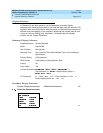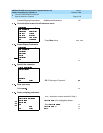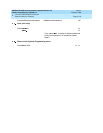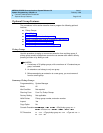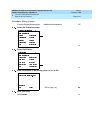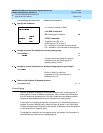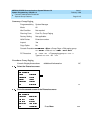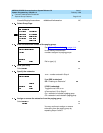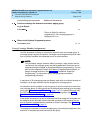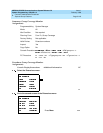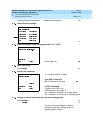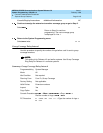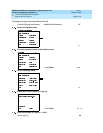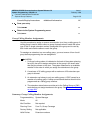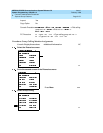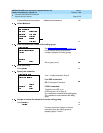
MERLIN LEGEND Communications System Release 6.0
System Programming
555-660-111
Issue 1
February 1998
Common Administrative Procedures
Page 3-145Optional Group Features
3
Console/Display Instructions Additional Information PC
Continue to assign the extension to another paging group
or go to Step 9.
Select
Return to Step 6 to continue
programming. The next paging group is
displayed on Line 1.
Return to the System Programming menu.
Select
twice.
Group Coverage Member Assignments 3
Use this procedure to assign or remove an extension from a coverage group. A
coverage group is a group of senders. Coverage is an arrangement by which calls
from a group of senders are redirected to one or more receivers.
NOTE:NOTE:NOTE:
This procedure assigns
senders.
Before you begin, make certain that the
receivers
for the coverage group are also programmed. Receivers can be
assigned through individual or centralized telephone programming. You can
also use the Integrated Solution II/III feature, Integrated Administration, to
assign coverage receivers. See Chapter 5, “Centralized Telephone
Programming,” for information about the appropriate centralized
programming procedure.
A maximum of 30 coverage groups are allowed, each with an unlimited number of
members. Up to eight receivers can be assigned per coverage group.
An extension can be a sender in only one group; it can be a receiver for more than
one coverage group. A calling group can be assigned as a receiver for a coverage
group (see “Group Coverage Receiver” on page –167
). In Hybrid/PBX mode only,
the QCC queue can be a receiver for up to 30 coverage groups. See “QCC
Operator to Receive Call Types” on page 46.
If the sender’s extension has one or more personal lines assigned, the sender can
be assigned as the principal user so that calls received on the personal line are
sent to receivers programmed for Individual or Group Coverage. See “Principal
User for Personal Line” on page 51.
To reassign an extension to a new coverage group, just make the assignment; the
extension is automatically removed from its old group.



